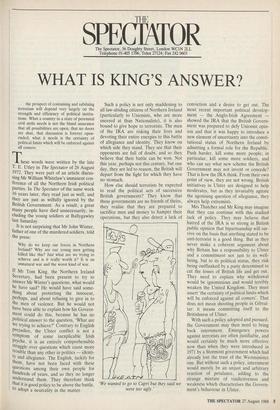WHAT IS KING'S ANSWER?
. . . the prospect of containing and subduing terrorism will depend very largely on the strength and efficiency of political institu- tions. What a country in a state of perennial civil strife needs is not the bland assurance that all possibilities are open, that no doors are shut, that discussion is forever open- ended; what it needs is the certainty of political limits which will be enforced against all corners.
These words were written by the late T. E. Utley in The Spectator of 26 August 1972. They were part of an article discus- sing Mr William Whitelaw's imminent con- ference of all the Northern Irish political Parties. In The Spectator of the same week 16 years later, they read just as well, and they are just as wilfully ignored by the British Government. As a result, a great many people have died unnecessarily, in- cluding the young soldiers at Ballygawley last Saturday.
It is not surprising that Mr John Winter, father of one of the murdered soldiers, told the press:
Why do we keep our forces in Northern Ireland? Why are our young men getting killed like this? Just what are we trying to achieve and is it really worth it? It is an unnatural war and the worst kind of war.
If Mr Tom King, the Northern Ireland Secretary, had been present to try to answer Mr Winter's questions, what would he have said? He would have said some- thing about protecting the innocent, Perhaps, and about refusing to give in to the men of violence. But he would not have been able to explain how his Govern- ment could do this, because he has no Political answer to the question, 'What are we trying to achieve?' Contrary to English prejudice, the Ulster conflict is not a sYmptom of some inexplicable Irish Psyche, it is an entirely comprehensible struggle over questions which cause more trouble than any other in politics — identi- ty and allegiance. The English, luckily for them, have not been faced with these questions among their own people for hundreds of years, and so they no longer understand them. They therefore think that it is good policy to be above the battle, to adopt a neutrality in the matter. Such a policy is not only maddening to all law-abiding citizens of Northern Ireland (particularly to Unionists, who are more sneered at than Nationalists), it is also bound to give hope to terrorists. The men of the IRA are risking their lives and devoting their entire energies to this battle of allegiance and identity. They know on which side they stand. They see that their opponents are full of doubt, and so they believe that their battle can be won. Not this year, perhaps not this century, but one day, they are led to reason, the British will depart from the fight for which they have no stomach.
How else should terrorists be expected to read the political acts of successive British governments? They know that these governments are no friends of theirs, they realise that they are prepared to sacrifice men and money to hamper their operations, but they also detect a lack of 'We wanted to go to Capri but they said we were too ugly.'
conviction and a desire to get out. The most recent important political develop- ment — the Anglo-Irish Agreement — showed the IRA that the British Govern- ment was prepared to defy Unionist opin- ion and that it was happy to introduce a new element of uncertainty into the consti- tutional status of Northern Ireland by admitting a formal role for the Republic. Push harder, kill some more people; in particular, kill some more soldiers, and who can say what new scheme the British Government may not invent or concede? That is how the IRA think. From their own point of view, they are not wrong. British initiatives in Ulster are designed to help moderates, but as they invariably agitate the agonising question of allegiance, they always help extremists.
Mrs Thatcher and Mr King may imagine that they can continue with this studied lack of policy. They may believe that hatred of the IRA is so strong in British public opinion that bipartisanship will sur- vive on the basis that anything stated to be anti-terrorist is a good thing. But as they never make a coherent argument about why Britain has a responsibility to Ulster and a commitment not just to its well- being, but to its political status, they risk being outflanked by a party determined to cut the losses of British life and get out. They need to explain why withdrawal would be ignominious and would terribly weaken the United Kingdom. They must assert 'the certainty of political limits which will be enforced against all corners'. That does not mean shooting people in Gibral- tar: it means committing itself to the Britishness of Ulster.
With such a policy adopted and pursued, the Government may then need to bring back internment. Emergency powers against terrorists are often justifiable, and would certainly be much more effective now than when they were introduced in 1971 by a Stormont government which had already lost the trust of the Westminister one. But without such a policy, internment would merely be an unjust and arbitrary reaction of petulance, adding to the strange mixture of vindictiveness and weakness which characterises the Govern- ment's behaviour in Ulster.














































 Previous page
Previous page